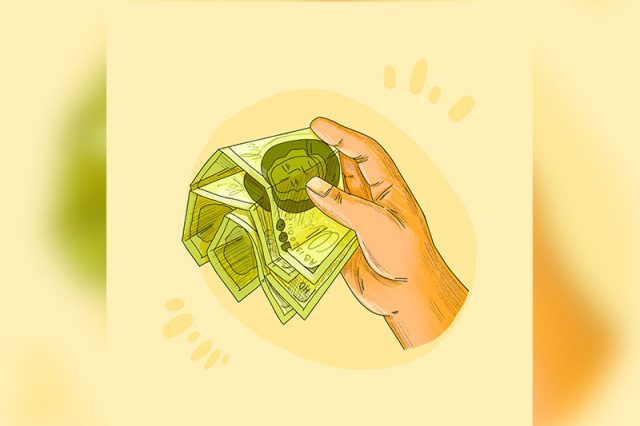(Updated; Nov. 28, 3:16 p.m.) The Department of Trade and Industry reminded the public to give exact change after a rider went viral for exploiting online customers.
Facebook users called out a rider who boasted of tricking patrons who use the cash-on-delivery feature into not giving them the exact amount of change and then setting the money aside for their own benefit.
“Life hack, kung isa kang rider (MoveIt, Angkas, Joyride, GrabFood, foodpanda, Lalamove, Shopee, Lazada, J&T, etc),” user Christian Abella wrote.
“Kapag ang sukli na lang ay P30 pababa, sabihin mo wala kang barya, kahit meron naman talaga. Para makaipon ka ng pangkain mo. Walang imposible, basta minsan magiging masama ka din,” he added.
The post was accompanied by a picture of a meal from a fast food chain.
Screengrabs of his posts were posted on some Facebook groups, while an online user called him a “scammer” rider.
A Facebook user who also identifies as a rider also called out the post after it was shared in a group.
“7 [seven] years na akong Angkas partner biker (5 years part-timer, 2023 up to present, full-time) pero never kong ginawa ‘yan, palagi ako may dalang panukli at most of the time na mauubos?” he said.
“Ipapapalit ko ulit ‘yung 100-200 pesos ko sa barya as in combination ng tig-piso, lima at bente. Sa hirap ng buhay, talagang mandatory sa’kin magbigay ng sukli. Utak gahaman ‘yang ganyan at hindi kaya ng prinsipyo ko kumain galing sa panlalamang,” the rider added.
“Dahil sa ganitong mga rider, kaya GCash or card ang pinagbabayad ko. Nagbibigay na lang ako ng tip sa mga may extra effort na mga rider talaga. Dati, halos lahat nagbibigay ako ng tip, pero ngayon, hindi na dahil sa mga ganitong mag-isip sa rider,” another user wrote.
The DTI learned of the so-called “hack” and said it violates the No Shortchanging Act or Republic Act 10909, which states that it is unlawful for businesses to shortchange a customer, “even if such change is only of a small amount.”
“Dapat eksakto ‘yung sukli mo. So bawal din na magbigay ka ng ibang uri ng sukli. So halimbawa, kendi,” Cherryl Carbonell, director of DIT’s Consumer Protection and Advocacy Bureau Fair Trade Group, said to GMA News.
The DTI said businesses are obligated to make exact changes, adding that this obligation extends to ride-hailing apps.
Carbonell said that ride-hailing apps can be considered a type of “informal business,” adding that they are part of the law.
Meanwhile, GMA was able to talk to Abella, who said that the post was just a “joke” and “for fun” only.
He said that he would not apologize to social media users who got angry with him.
Violating the No Shortchanging Act can lead to a three-month suspension of a business if the offense is done three times.
If the offender is caught four times, their operating license is canceled.
Ride-hailing app responds
Motorcycle ride-hailing app Move It said that it “strongly condemns any behavior” that goes against its principles of honesty, transparency, and safety following the viral post.
“We have promptly investigated a viral post by one of our rider-partners regarding a supposed ‘life hack’ around passenger shortchanging. Such actions are entirely unacceptable and have no place in our community of hardworking and honest rider-partners,” it said in a statement sent to Interaksyon.
“MOVE IT does not condone any actions made by individuals that tarnish the reputation of thousands of our rider-partners who uphold the highest standards of honesty, professionalism and respect towards our passengers,” the ride-hailing service added.
It said that Abella was “immediately called in for investigation” following the incident, saying that he “received corresponding disciplinary sanctions based on the gravity of the infraction demonstrated.”
“Although the rider claims that his post was fictional and intended as a joke, MOVE IT treats such matters with utmost seriousness,” the app said.
It also encouraged passengers to report “any incidents of inappropriate behavior by riders” to them through the app’s “Report an Issue” feature or the “Star Rating” feature on the Activity Tab.
“We ensure that these reports are promptly addressed, ensuring a fair and just resolution for the affected party,” the ride-hailing service said.
“MOVE IT remains committed to maintaining a trustworthy and reliable service for all its users. Your safety and satisfaction are our top priorities,” it added.










